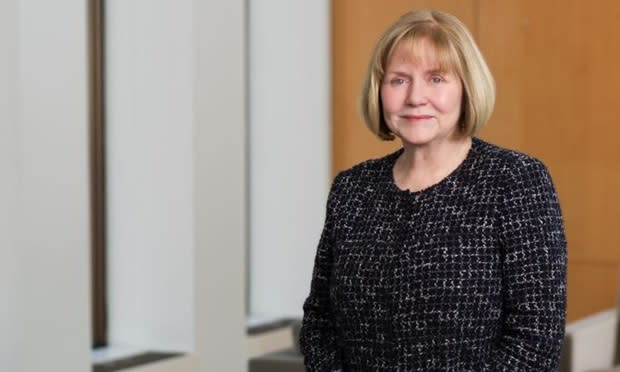Colleagues Praise Choice of Barbara Jones to Review Michael Cohen Docs
[caption id="attachment_29161" align="alignnone" width="620"]

Barbara Jones[/caption] In choosing former federal judge Barbara Jones as special master over documents seized from Michael Cohen's home and office, U.S. District Judge Kimba Wood rejected the names suggested by both prosecutors and Cohen's lawyers. Nonetheless, Jones, a Bracewell partner who left the Southern District bench in early 2013, has a wealth of experience and knowledge for the job. As special master, Jones will preside over the review process of sensitive documents that FBI agents seized from Cohen's home and his former office at Squire Patton Boggs. The Southern District U.S. Attorney's Office and defense attorneys for Cohen, a longtime personal attorney for President Donald Trump, remain locked in a dispute over how many documents are privileged and which documents prosecutors can review. Jones served on the Southern District bench for about 16 years. After leaving the bench, she practiced at Zuckerman Spaeder and then moved to Bracewell in 2016. Her arrival at the second firm came shortly after one of Bracewell's former name partners—Rudy Giuliani, now one of the president’s personal attorneys in special counsel Robert Mueller's investigation—left Bracewell for Greenberg Traurig. At the time of the law firm change, Jones said she moved to Bracewell to expand her practice and handle more monitorships and internal investigations. Jones was appointed to the bench by President Bill Clinton. She began her legal career in 1973 working as a special attorney in organized crime and racketeering in the U.S. Justice Department’s Criminal Division, a role that also included the Manhattan strike force against organized crime and racketeering. She became a federal prosecutor in the Southern District in 1977, rising to become chief of the general crimes unit in 1983 and chief of the organized crime unit from 1984 to 1987, serving under Giuliani, then the U.S. attorney of the Southern District. Right before her nomination in 1995 by Clinton, she served as chief assistant to then-Manhattan District Attorney Robert Morgenthau. From Bernie Ebbers to Edie Windsor As the Law Journal previously reported, Jones handled a series of high-profile cases while on the federal bench. She ruled in 2001 that banks issuing Visa and Mastercard credit cards violated antitrust law by maintaining exclusionary rules against American Express and Discover. She presided over the 2005 trial of WorldCom co-founder and CEO Bernie Ebbers, who was convicted of orchestrating and covering up a fraud that cost investors $100 billion. One of the biggest cases in Jones’ career came when she ruled for plaintiff Edie Windsor and struck down the portion of the federal Defense of Marriage Act that defined marriage solely as a union between a man and a woman. Jones found the law violated the Equal Protection Clause in discriminating against same-sex married couples. Windsor ultimately won before the U.S. Supreme Court. “I can’t imagine a better job than this,” Jones said on leaving the bench. “You have power and it’s daunting and you have to be extremely careful with it, because you can do a tremendous amount of good as well.” Shira Scheindlin, a former colleague of both Jones and Wood on the Southern District bench, said Thursday that she is a “very sensible pick” to serve as special master. Scheindlin, now at Stroock & Stroock & Lavan, noted Jones was solely in law enforcement before serving on the bench. “It’s just what you think you would want when you’re dealing with a Fourth Amendment search issue that rolls over into attorney-client privilege,” she said. Meanwhile, Jones has practiced at a defense law firm for more than four years. “I think it’s probably pleasing to both sides,” Scheindlin added. Longtime criminal defense attorney Paul Shechtman, who moved with Jones from Zuckerman Spaeder to Bracewell in 2016, told ALM, “Judge Wood could not have made a better pick. I gather both sides agreed that it was a wise choice, and I would think that so would the rest of the New York City bar.” When asked if he could be helping Jones in her role as special master, Shechtman said no, but added, “I plan to get her coffee in the morning.” Prosecutors this week withdrew their objection on having a special master oversee a review of documents seized from Cohen's office earlier this month. They had proposed former Magistrate Judge Frank Maas; Maas’ colleague at JAMS, former Magistrate Judge Theodore Katz; and former Magistrate Judge James Francis IV. Cohen's attorneys at McDermott Will & Emery had provided a list comprised of all former prosecutors from the Southern District of New York who are now long-standing practitioners in private practice: Guidepost Solutions Chairman Bart Schwartz; Ropes & Gray partner Joan McPhee; Park Jensen Bennett name attorney Tai Park; and Milbank, Tweed, Hadley & McCloy partner George Canellos. Rule 53 of the Federal Rules of Civil Procedure, which governs the selection of special masters, provides that parties can have input on the selection, but a federal judge has discretion over the pick. If Jones' appointment was made under Rule 53, it would be expected that Jones files a disclosure of potential conflicts, Scheindlin noted.

